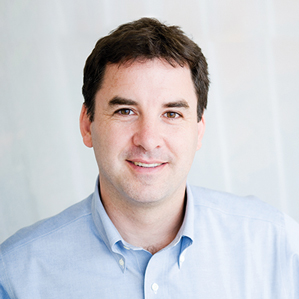“Neighborhoods are made up of people who feel invested in a place,” says Tim Rowe, MBA ’95, flicking a piece of sidewalk trash into a garbage bag as he walks down an alley between the Volpe Center and the Biogen building. “Until you pick up the cigarette butts, it’s not yours.” Clad in khakis and loafers, Rowe is not your typical garbage collector. Today, he happens to be leading a crew from the Cambridge Innovation Center, a space for startups that he founded more than 15 years ago, in an annual neighborhood cleanup sponsored by the Kendall Square Association—an organization he also founded.

Like many who graduated from Sloan in the 1990s, he set out to build a tech startup. After contacting MIT to ask for the smallest space it had for rent, he signed the lease for a 3,000-square-foot office, which was still too large for him and his wife, Amy. So they invited friends to join them; as his officemates, including Amy, started firms, Rowe continued to set up infrastructure—making sure the lights came on and the Internet worked. Eventually, he realized he’d found his business, and the Cambridge Innovation Center (CIC) was born.
Now more than 600 companies inhabit multiple floors of CIC’s space at One Broadway. With use of the shared workspace going for $350 a month and office space starting at $1,200 for a two-person office, entrepreneurs can set up shop and have access to conference rooms, kitchens, and printing facilities—to say nothing of chance meetings with fellow entrepreneurs or venture capitalists in elevators or at weekly Venture Café mixers. Among the success stories that environment has produced are the teams behind Google’s Android operating system and the Internet marketing startup HubSpot.
In fact, the center has been so successful that Rowe opened a Boston outpost in May 2014 and a branch in Saint Louis last September. CIC’s first international space is slated to open in Rotterdam in 2016.
“Just like Milan is the fashion center of the world or Hollywood is the center for the entertainment industry,” says Rowe, “I believe the world is yearning for an epicenter for innovators—and that Kendall Square is ideally positioned to become that epicenter.”
Keep Reading
Most Popular
Large language models can do jaw-dropping things. But nobody knows exactly why.
And that's a problem. Figuring it out is one of the biggest scientific puzzles of our time and a crucial step towards controlling more powerful future models.
How scientists traced a mysterious covid case back to six toilets
When wastewater surveillance turns into a hunt for a single infected individual, the ethics get tricky.
The problem with plug-in hybrids? Their drivers.
Plug-in hybrids are often sold as a transition to EVs, but new data from Europe shows we’re still underestimating the emissions they produce.
Google DeepMind’s new generative model makes Super Mario–like games from scratch
Genie learns how to control games by watching hours and hours of video. It could help train next-gen robots too.
Stay connected
Get the latest updates from
MIT Technology Review
Discover special offers, top stories, upcoming events, and more.